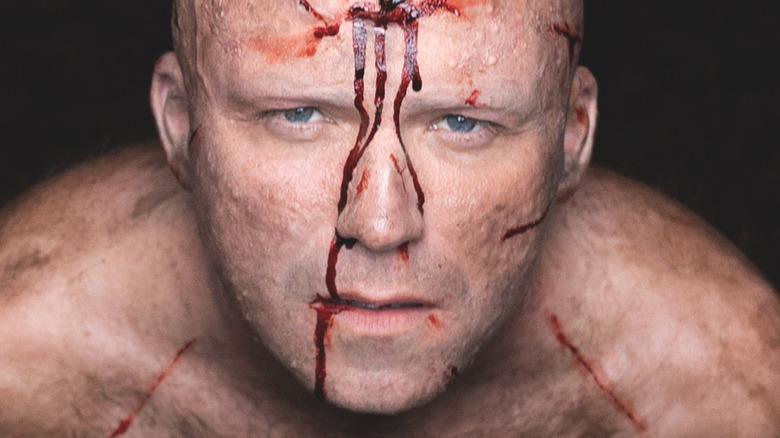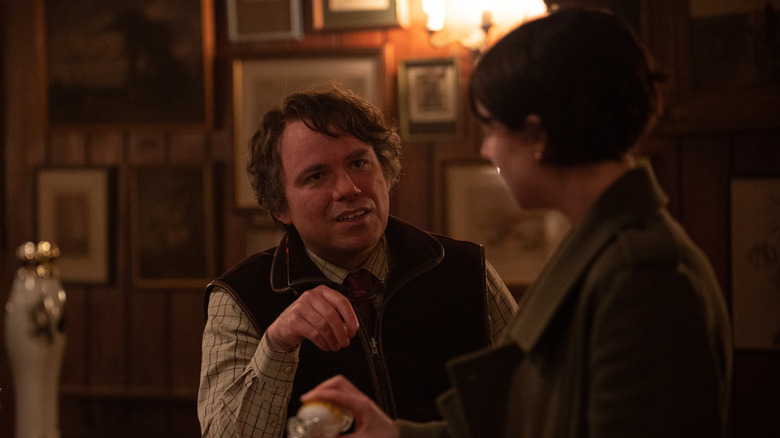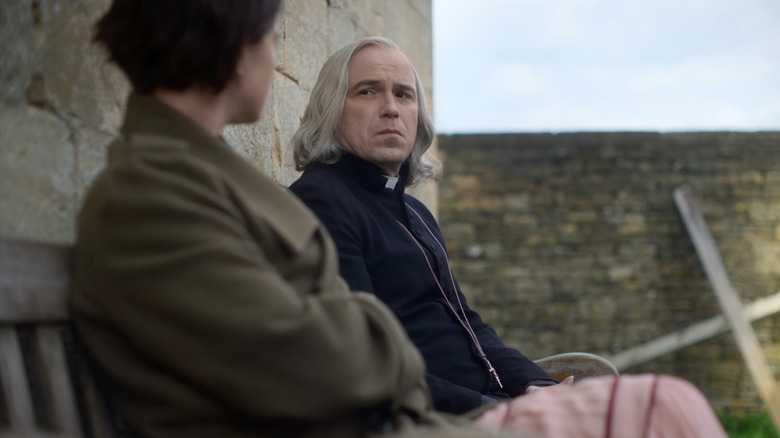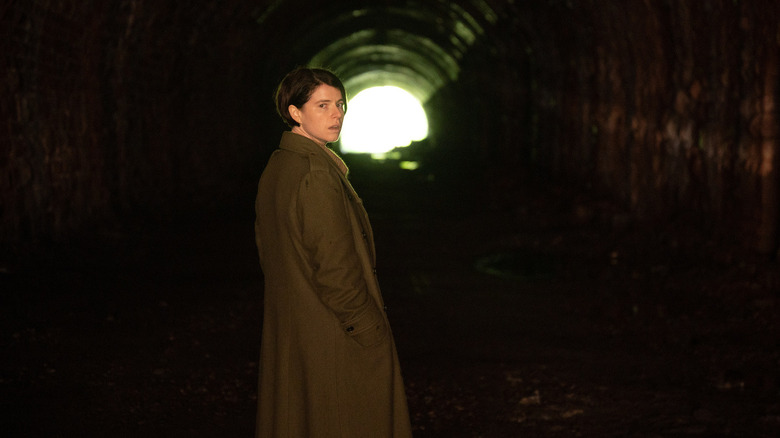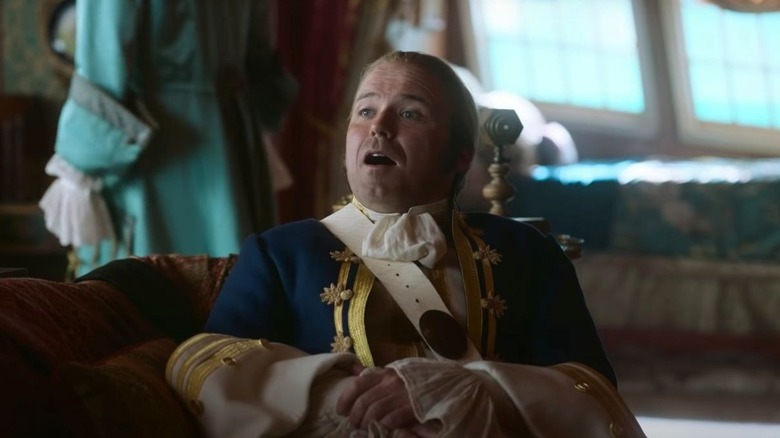Rory Kinnear On His Incredible Performance In Men, His Future With 007 And More - Exclusive Interview
"Men" is the chilling new movie from writer-director Alex Garland, whose previous efforts include sci-fi mind-benders like "Ex Machina" and "Annihilation" and the Hulu limited series "Devs." Jessie Buckley ("The Lost Daughter") plays Harper, a young woman who flees London after the devastating death of her husband and rents a secluded house deep in rural England. A disturbing series of events — from being stalked in the woods by a naked man to the increasingly hostile behavior of other men in the village — makes Harper realize that she is the target of an ancient, primal force that wears many faces.
That last part is literal. With the exception of Jessie's husband (played by Paapa Essiedu), British actor Rory Kinnear plays every man in the film, from the overly-chummy Geoffrey who rents her the house to the condescending local vicar, who offers her some shockingly inappropriate advice. Kinnear also plays the local pub owner, the customers in the pub, a police officer, the clothes-free stalker and even more bizarre manifestations of what could be construed as toxic masculine energy.
Or is that just how Jessie sees them? The answers are left for the viewer to decide in Garland's eerie, surreal film. Both Buckley and Kinnear are outstanding, and the latter's shapeshifting performance is a tour de force. Kinnear — who's played MI6 chief of staff Bill Tanner in the last four James Bond movies and recently played twin brothers in the HBO pirate comedy "Our Flag Means Death" — tells Looper about his role(s), "There's no getting away from the fact that it will be a disconcerting or disquieting experience when you get to be aware that is it the same person."
Rory Kinnear knew he'd be playing almost every man in the movie
Was the intent all along for you to be playing all the men? Was that how Alex pitched it to you and was that in the script from the start?
I can't remember if it was in the script, but certainly that was the note that came through when I was offered it. It's pretty intriguing and pretty exciting as an actor to be able to do all of that within the space of 90 minutes. The first thing I said to Alex, when I met up with him, was that this couldn't be an acting exercise or a display of chameleonic talents. It can't be about me. Each character has to exist within this credible world, and just as credibly as Harper.
There's no getting away from the fact that it will be a disconcerting or disquieting experience when you get to be aware that is it the same person and working out as an audience that it is the same person. That was part of Alex's intention, but within each scene, each character has to breathe and speak and behave just as credibly and individually as any other job you would do.
In a different movie and with different people involved, this could easily be a gimmick, but the way you and Alex did it, it subtly creeps up on the viewer that these are all one man.
We — with Geoffrey, I'm a bit younger than he probably is, although he's probably preternaturally old and has always been old. There was always going to be a slight disconcerting thing the first time you met him, a slight questioning as to the casting — why is this guy playing this guy? — and there being no explanation for it until, as the film goes on, you realize, "Oh, that is meant to be a disquieting effect — it's been chosen deliberately."
Each character was given his own look and backstory
Did Alex have specific descriptions for each man in the script or was that something that you and he developed along the way? I read that you also wrote little bios for each character as well.
That was the first thing I did. I knew that there's someone who's going to be in charge of hair and makeup and there's going to be someone in charge of costume, and they're going to be working away themselves. It was early enough in the creative process to be able to get in there first and say, "I'm seeing it like this." That was why, when I was writing biographies, it wasn't, "He looks like this," or "He wears these." It was, this is the history of this person as I see them, and [these are] the [kinds] of things they're into and what they like, and this is the music that they like and all that stuff.
I wasn't trying to prescribe a look, but I was trying to suggest the kind of person they were, because in the script, there wasn't a great deal of description — particularly in the pub, those characters. That was great to be able to send those off to Lisa [Duncan], the head of costume, and to Nicole [Stafford], head of makeup, to be able to begin their process with me. Then, they would [give] feedback [on] various mood boards as to looks, and then we'd meet up and go through costumes. Then, when we actually got to The Cotswolds to begin that rehearsal process, when we were rehearsing nearby where we were going to shoot, most days I would try out a different look and it was a question of things feeling right, and things eventually feeling like they fitted.
It was interesting [about] which characters you felt like, "Oh yeah, they do need some teeth to differentiate themselves a bit," or "Actually, these contact lenses completely change who I am." The vicar is the only one who wears contact lenses, but it gives him a completely different aspect. A little funny also, on a personal level, was seeing how differently people behaved to me, day to day, depending on who I was playing. I wasn't staying in character in between takes; I was still Rory, but people behaved completely different to me, depending on what wig and teeth I had.
For once, the man gets naked
There is extensive male nudity in this movie. For years, that wasn't part of films — it was always about women. Doing it in this film, and certainly with the climate having changed over the last few years, do you have a better appreciation for what women experienced having to do that on set in previous decades?
I will fess up that the nudity is quite often CGI'd, but I have done nudity myself previously, and it's quite an exposing thing quite literally. The only thing with me, when it's probably been required of me, I don't think it's been used to titillate. Much as I might like it to be, I don't think it is. That aspect of female nudity, through the years, has been something that has caused a lot of distress over the years. I feel like there is a bit more transparency and honesty and ability to say "no" and really question the necessity of it now.
I've always felt that as viewer as well. I don't like to see actors being compromised or feeling like they're doing something for an audience and potentially [feeding] a male gaze, rather than something that is necessary as the character. Why the nudity is important for that character [in this movie] is the primacy that he represents, that unadorned primacy of the natural world. You're fully committed to why it was important.
His future with Bond and Our Flag Means Death
You've played Bill Tanner in the last four James Bond films — longer than some of the actors have been Bond. Do you get any sense that your version of Bill Tanner will be back with the next 007?
I don't know. I didn't even know, film to film, through Daniel [Craig]'s time, whether or not I'd be back. You always hoped that you might be, but I can see both things potentially being appealing. With a new Bond, they can try and create an entirely new world around him, or — like with [Judi Dench playing M] from Pierce [Brosnan] to Daniel — they can try and create a sense of continuity. They're fun things to do, so I wouldn't turn my back on it, but I can totally see the options ahead of them and I don't know which way they'll go.
After playing multiple roles in "Men," you recently played twin brothers on "Our Flag Means Death."
It's an unusual niche to have found myself in.
How was that experience, and do you hope that there might be a third Badminton brother out there, should the show get renewed?
It was great. Working out on those Warner Brother lots, with that big ship and getting to play two distinctly different characters and brothers — I went straight from filming "Men" to Los Angeles to film that, so you couldn't have had anything quite so different in terms of tone and tenor. Actually, both of them have a seriousness of purpose to them as well, and a real commitment to the humanity that both shows are investigating. Maybe there are more similarities than differences.
"Men" is now playing in theaters.
